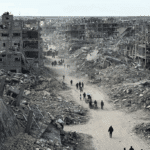The Hague, 19 November 2015 – The sentence of the Congolese warlord Germain Katanga has been reduced and will end in January 2016. Such is the decision taken on 13 November by the judges of the International Criminal Court (ICC). ASF is considering the consequences of this decision for the future of cases before the Court and especially for the participation of victims in proceedings. Victims and the Congolese authorities are also afraid of the destabilising effect of Mr Katanga’s return to the Democratic Republic of Congo. In March 2014 he was sentenced to 12 years imprisonment for crimes against humanity and war crimes committed against the villagers of Bogoro (in the east of the DR Congo). All in all, he will have served nine years and four months.
In its decision, the ICC followed the arguments of the defence, partially supported by the Prosecutor, by considering among other factors that Mr Katanga had effectively cooperated with the Court, in particular by the fact of his testimony, that he had publicly and repeatedly renounced his crimes, and demonstrated good chances of reintegration into society.
There is a significant risk that this decision will disappoint the victims, who had already emphasised their disappointment with the initial sentence. During discussions before the judges, they had recalled their doubts about the sincerity of Mr Katanga’s apologies; these doubts were shared by the Congolese authorities.
The victims’ lawyer – with the Congolese authorities following suit – had stressed the destabilising effect that Mr Katanga’s return might have. For the victims, it is inconceivable that the convicted individual could be pardoned and return to the region, while the Court has not yet even decided on reparations for victims.
The Prosecutor’s position in this case was unexpected. “Much more than simply not opposing the convict’s request, the Prosecutor provided arguments in support of this request”, says Jean-Philippe Kot, international justice expert at ASF. “The Prosecutor noted the savings in time and money that Mr Katanga allowed the Court to achieve by deciding not to appeal against his sentence.”
This reversal is striking. At first the Prosecutor presented Mr Katanga as one of the main instigators of crimes committed in Bogoro. Calling for 22 years of imprisonment, the Prosecutor had asked the Court to reject the defence’s arguments based on Mr Katanga’s family situation, his ability to reintegrate or his good behaviour in prison. One year later however, the Prosecutor is publicly justifying a reduced sentence based for the most part on those same arguments.
In this case, the victims have expressed great frustration that is likely to grow. When Mr Katanga was sentenced in 2014, they called on the Prosecutor to continue to investigate to ascertain the other main perpetrators of the attack.
“This case raises the issue of the consequences of a policy of the Office of the Prosecutor: is it logical for those affected first and foremost, namely the victims?” asks Mr Kot. “The victims remain the primary sources of information for investigations. Without their trust in the institution, the future of investigations by the Office of the Prosecutor could be undermined.”
ASF has worked alongside Congolese associations from the beginning of the preliminary investigation to identify victims, explain to them why their involvement in the trial matters, and facilitate their participation. In total, 355 victims took part in the trial.
Coverpicture: Germain Katanga © ICC-CPI



